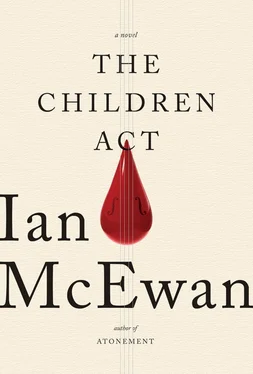In a careful neutral tone, he asked her if she was all right. When she said “fine” it surprised her how normal she sounded. She began to improvise with facility, just as Pauling, with a satisfied sigh, remembered a shortcut and pulled free of the traffic. Plausible enough in the way of good housekeeping to remind Jack of her return date at the end of the month, and natural, or it had once been, to suggest that on the evening she came home they should go out for a meal together. A nearby restaurant they liked was often booked up in advance. Perhaps he could make a reservation now. He thought it was a good idea. She heard him suppress the surprise in his voice, steering cleanly between warmth and distance. He asked her again if she was all right. He knew her too well, and clearly, she wasn’t sounding quite so normal. With lightened emphasis she said she was absolutely fine. They exchanged a few lines about work. The call ended on his cautious good-bye that sounded almost like a question.
But it had worked. She was lifted from paranoid reveries into the actuality of an arrangement, a date, an improving relationship. She felt better defended and altogether more sensible. If there had been a complaint against her, she would have heard it by now. It was good to have phoned and moved matters on from that indefinable breakfast moment. Worth remembering the world was never how she anxiously dreamed it. An hour later, as the car began the slow crawl along the congested A69 into Carlisle, she was absorbed in court papers.
And so it was, two weeks later, her circuit complete and yet more justice dispensed across four northern cities, she faced her husband across a quiet corner table in a Clerkenwell restaurant. A bottle of wine stood between them, but they drank it warily. There was to be no sudden rush to intimacy. They kept away from the subject that might have destroyed them. He spoke to her with an awkward delicacy, as though she were some kind of unusual bomb that might go off mid-sentence. She asked about work, about his Virgil book, an introduction and selection, a “worldwide” textbook for schools and universities which, he touchingly believed, would make his fortune. Nervously, she posed one question after another, aware that she was sounding like an interviewer. She hoped to observe him as though for the first time, see the strangeness in him, as she had many years before, when she fell in love with him. Not easy. His voice, his features were as familiar as her own. His face had a rugged, haunted look. Attractive, of course, but not to her just then. His hands, resting on the table by his glass, were not, she hoped, about to take one of hers.
Toward the end of the meal, when they had exhausted the safer topics, there came a threatening silence. Their appetites were gone, their desserts and half the wine were untouched. Unspoken mutual recrimination troubled them. Still on her mind, his brazen excursion; on his, she presumed, her overblown sense of injury. In a forced tone, he began telling her about a geology lecture he’d been to the night before. It described how the sequence of sedimentary rock strata could be read like a book of the earth’s history. To finish, the lecturer allowed himself some speculation. A hundred million years into the future, when much of the oceans had sunk into the earth’s mantle and there wasn’t enough carbon dioxide in the atmosphere to sustain plants and the surface of the world was lifeless rocky desert, what evidence would a visiting extraterrestrial geologist find of our civilization? A few feet below the ground a thick dark line in the rock would mark us off from all that had gone before. Condensed into that six-inch sooty layer would be our cities, vehicles, roads, bridges, weapons. Also, all sorts of chemical compounds not found in the previous geological record. Concrete and brick would weather down as easily as limestone. Our finest steel would become a crumbling ferrous stain. A more detailed microscopic examination might reveal a preponderance of pollen from the monotonous grasslands we had made to feed a giant population of livestock. With luck, the geologist might find fossilized bones, even ours. But wild creatures, including all the fish, would barely make up a tenth of the weight of all the sheep and cows. He was bound to conclude that he was looking at the beginning of a mass extinction in which life’s variety had started to narrow.
Jack had been speaking for five minutes. He was oppressing her with the weight of meaningless time. The unimaginable desert of years, the inevitable end, animated him. But not her. Bleakness was settling around her. She felt the weight of it on her shoulders and down through her legs. Taking her napkin from her lap, she placed it on the table, a gesture of surrender, and then stood.
He was saying, as though in wonder, “This is how we’re signing our names in the geological record.”
She said, “I think we should get the bill,” and walked quickly across the restaurant to the ladies’, where she stood in front of the mirror, eyes closed, comb in hand in case someone came in, and drew a few slow deep breaths.
The thaw was neither quick nor linear. At first it was a relief, not to be self-consciously avoiding each other around the flat, not to be coldly competing in politeness in that stifling way they had. They ate meals together, began to accept invitations to supper with friends, had conversations—about work mostly. But he still slept in the spare room, and when a nineteen-year-old nephew came to stay, he moved onto the sitting-room couch again.
Late October. The clocks went back, marking the final stretch of an exhausted year, and the darkness closed in. For a few weeks, a new stasis developed between her and Jack and seemed almost as suffocating as before. But she was busy, and too tired in the evenings to begin the demanding conversations that might move them to a new stage. In addition to the usual caseload in the Strand, she was chairing a committee on new court procedures, and sat on another to respond to a white paper on family-law reform. If she had the energy after supper, she practiced alone at the piano, in preparation for her rehearsals with Mark Berner. Jack was busy too, filling in for a sick colleague at the university, and at home absorbed in writing the long introduction to his Virgil selection.
She and Berner had been told by the barrister organizing the Christmas Revels in the Great Hall that they had been chosen to open the concert. They were to perform for no more than twenty minutes, allowing five minutes maximum for an encore. Enough time for their selection from Berlioz’s Les nuits d’été and a song by Mahler, one of the Rückert-Lieder, “I am lost to the world.” The Gray’s Inn choir would sing some Monteverdi and Bach, followed by a string quartet performing Haydn. A large minority of Gray’s Inn benchers spent many evenings a year listening in frowning concentration to chamber music over in Marylebone, at Wigmore Hall. They knew the repertoire. It was said they knew a bad note before it was played. Here, even though there would be wine beforehand and the general atmosphere, at least outwardly, would be forgiving, standards were punitively high for an amateur affair. Sometimes Fiona woke before dawn and wondered if she was up to it this time, whether there was some way she could excuse herself. She thought she lacked the concentration, and the Mahler was difficult. So languorously slow and poised. It would expose her. And the Germanic yearning for oblivion made her uncomfortable. But Mark was burning to perform. Two years before, his marriage had broken up. Now, according to Sherwood Runcie, there was a woman in his life. Fiona guessed that she would be in the audience and Mark was keen to impress her. He had even asked Fiona to learn the pieces by heart, but that, she told him, was beyond her. Only their three or four little encores were committed to memory.
Читать дальше












